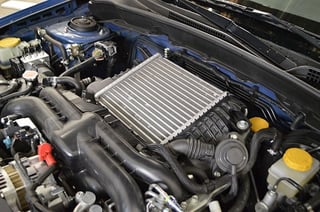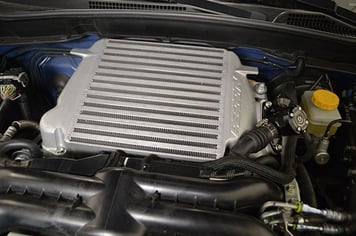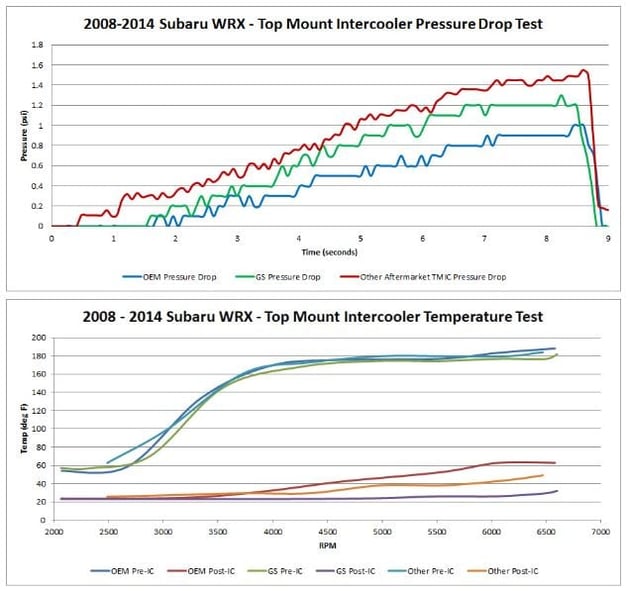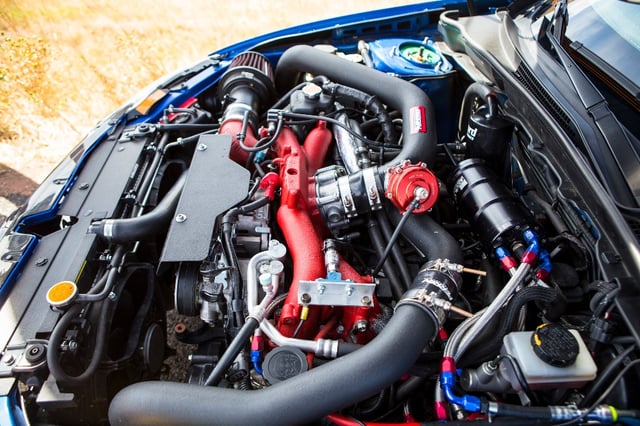Search for topics or resources
Enter your search below and hit enter or click the search icon.

WRX and STI intercoolers are top mounted from Subaru. We all know this. It's nice that Subaru keeps a functional hood scoop on these cars. Being able to pass ambient air through a cooling device sitting on top of a hot engine definitely makes the intercooler work much better. But they're not doing you any favors with that puny, plastic tanked design on top. It's a bare minimum intercooler which is why you need to upgrade it if you want your WRX or STI to perform well. For this article, we'll only be addressing replacing your intercooler with another top mount intercooler.
Reason #1: Pretty much anything is better than stock
 The OEM intercooler on the STI is better than the one on the WRX, however, they both have plenty of room for improvement. The factory intercoolers are thin and have lower fin density, and this all translates into a lack of performance. They are quick to heat soak, and they are barely capable of prolonged performance, even at stock boost levels. Once you start to turn up the boost with tuning and other performance parts, the OEM TMIC quickly becomes a bottleneck. Most upgraded WRX and STI intercoolers will feature bar and plate cores. But even if they don't, the fin design and overall size of a better intercooler will help keeps the temperatures more consistent and cooler. On top of that, the build quality isn't hard to improve. Stock plastic end tanks are glued onto the core and over time, the structural integrity can be compromised.
The OEM intercooler on the STI is better than the one on the WRX, however, they both have plenty of room for improvement. The factory intercoolers are thin and have lower fin density, and this all translates into a lack of performance. They are quick to heat soak, and they are barely capable of prolonged performance, even at stock boost levels. Once you start to turn up the boost with tuning and other performance parts, the OEM TMIC quickly becomes a bottleneck. Most upgraded WRX and STI intercoolers will feature bar and plate cores. But even if they don't, the fin design and overall size of a better intercooler will help keeps the temperatures more consistent and cooler. On top of that, the build quality isn't hard to improve. Stock plastic end tanks are glued onto the core and over time, the structural integrity can be compromised.
Reason #2: Easier on the wallet than a FMIC
 Every build starts with a budget or at least some sort of reasonable limit for each person. Some budgets are smaller than others. So, if your build goal isn’t monster power and a full-fledged track car, then you probably don’t need to spend the extra money on a good FMIC when a TMIC will suite you better. There are many TMIC’s on the market that are more than capable of supporting larger amounts of power. If your goal is a fast street car/daily driver, a TMIC may be the better option for you. Even if you plan on putting a bigger turbo on your WRX or STI, a top mount intercooler is still not a bad option. So unless you plan on spending a lot of time in boost and pushing the limits often, you may be better off going with the less expensive TMIC vs an overkill FMIC.
Every build starts with a budget or at least some sort of reasonable limit for each person. Some budgets are smaller than others. So, if your build goal isn’t monster power and a full-fledged track car, then you probably don’t need to spend the extra money on a good FMIC when a TMIC will suite you better. There are many TMIC’s on the market that are more than capable of supporting larger amounts of power. If your goal is a fast street car/daily driver, a TMIC may be the better option for you. Even if you plan on putting a bigger turbo on your WRX or STI, a top mount intercooler is still not a bad option. So unless you plan on spending a lot of time in boost and pushing the limits often, you may be better off going with the less expensive TMIC vs an overkill FMIC.
Reason #3: Still a legitimate performance increase
We’ve already established that the intercooler is a necessary upgrade on the WRX and STI if you care about tuning and power. One of the reasons the TMIC is preferred is because it offers a huge bump in performance without taking away any of the response. With larger high flow intercoolers, you will always find a little more pressure drop. The TMIC avoids a lot of this pressure drop and allows you to maintain throttle response as close to stock as possible. A shorter path for the air to travel is ideal. Another performance benefit to a TMIC is that the WRX or STI is already optimized for it. With the big hood scoop and the ducting, air is forced to go through the intercooler instead of around it. Many TMIC kits will come with suitable ducting for the new core size too. Despite its tendency to heat soak faster than a front mount, the top mounts are often very efficient with the proper ducting because more air is forced through them, whereas on a front mount, unless you have a properly ducted front bumper area, a lot of the air can spill around the intercooler and isn't actually used for cooling.
Pressure Drop and Temperature Delta - GrimmSpeed TMIC vs Stock

Reason #4: Convenience and Fitment
It is probably common sense, but the upgraded top mount intercoolers are far more easy to install than a front mount. So, if you don’t have a lot of tools, or if you don’t have a lot of time, a TMIC is going to be an excellent choice for you. Many of the upgraded TMICs on the market come with new ducting to make the most use of the larger than stock core and the factory air scoop. It is these TMIC’s that will perform best on your WRX/STI. The other benefit, and I believe this is a huge benefit, is the lack of joints and couplers which makes for potential boost leaks. And speaking of boost leaks, if you have one, there is a whole lot less area to check before you find it.

This post was originally published in January, 2017 but has been updated to reflect current parts and accurate information!
Topics: